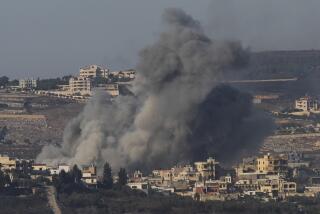Settlement Sprawl Cuts Off Palestinians
TAIBE, West Bank — Daoud and Maria Khoury watch it from their kitchen window.
Each year, each month, another little bit of the Jewish settlement of Ofra comes a little bit closer.
Taibe is a predominantly Christian Palestinian village that sits just east of Ofra, across a stony valley. Ofra’s easternmost trailers have sprouted on the ridge and begun marching down the slope. With the housing, a new settlers-only road has appeared as well as light posts that illuminate the night.
“It doesn’t look very good,” Daoud Khoury, 46, said. “They’re taking more and more land. They talk about land for peace, but this shows they have no intention of [leaving] the West Bank. They think it’s all for them.”
The Khoury patriarch, Canaan, who died in September, moved to Taibe in 1948, after Israel’s war of independence forced him from his home in the coastal city of Jaffa. Most of his children studied overseas but returned after the 1993 Oslo accords ushered in what many believed would be peace and the creation of an independent Palestine.
The Khourys invested $1.2 million to build the only brewery in the Palestinian territories. Until the outbreak of the current intifada, or uprising, almost 27 months ago, the Taybeh microbrewery was wildly successful.
It was producing at full capacity, about 50 U.S. barrels a week, and distributing inside Israel and as far away as Germany. Now, output is 20% of capacity and expansion plans have been shelved.
Part of the problem is the frequent closures that the Israeli army slaps on Taibe and most other Palestinian towns. Palestinians cannot leave their homes except when the army allows. And while settlers have free rein on the roads, Palestinian use is restricted.
The settlements, and all of the security apparatus that goes into protecting them, has created what Israeli human rights advocates describe as two parallel, unequal regimes. Settlers have all the rights, and then some, of Israeli citizens, while the Palestinians suffer enormous discrimination, human rights groups say.
Khoury said entrances to Taibe are routinely blocked by the military. Maria manages to get their two sons to school in Ramallah, the nearest Palestinian city, on most days, but they have to travel circuitous and often dangerous routes that can take hours. Even then, it’s only possible because Maria holds a foreign passport.
Khoury’s sister Grace gave up, and this fall put her children in one of Taibe’s inferior schools.
“We sacrificed education for safety,” she said.
Watching the expansion of settlements like Ofra, while their own worlds are constantly curtailed, is part of what Palestinians see as an Israeli strategy of harassment.
“They want us to pack up, close the brewery and leave the land,” Khoury said. “In their dreams!”
More to Read
Sign up for Essential California
The most important California stories and recommendations in your inbox every morning.
You may occasionally receive promotional content from the Los Angeles Times.











